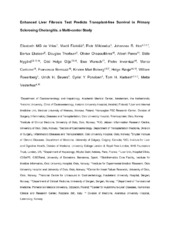Enhanced liver fibrosis test predicts transplant-free survival in primary sclerosing cholangitis, a multi-centre study
de Vries, Elisabeth M.G.; Färkkilä, Martti; Milkiewicz, Piotr; Hov, Johannes Espolin Roksund; Eksteen, Bertus; Thorburn, Douglas; Chazouillères, Olivier; Pares, Albert; Nygård, Ståle; Gilja, Odd Helge; Wunsch, Ewa; Invernizzi, Pietro; Carbone, Marco; Bernuzzi, Francesca; Boberg, Kirsten Muri; Røsjø, Helge; Rosenberg, William; Beuers, Ulrich H.; Ponsioen, Cyriel Y.; Karlsen, Tom Hemming; Vesterhus, Mette
Peer reviewed, Journal article
Accepted version
Permanent lenke
https://hdl.handle.net/1956/18855Utgivelsesdato
2017-10Metadata
Vis full innførselSamlinger
Originalversjon
https://doi.org/10.1111/liv.13402Sammendrag
Background & Aims: Biomarkers reflecting disease activity and prognosis in primary sclerosing cholangitis (PSC) have not been firmly established. Enhanced liver fibrosis (ELF) test was previously reported to predict outcome in PSC. We aimed to validate the prognostic utility of ELF test in an independent, multi‐centre, retrospective PSC study population. Methods: We collected serum samples from PSC patients from seven countries. We estimated rates of transplant‐free survival by the Kaplan‐Meier method, used Cox proportional hazards regression to explore the association between ELF test and clinical outcome and determined prognostic performance of ELF test by computing the area under the receiver operating characteristic (AUC‐ROC) curve. Results: The final analysis included 534 PSC patients (61% males). Features of autoimmune hepatitis or concomitant inflammatory bowel disease affected 44 (8%) and 379 (71%) patients respectively. ELF test levels were higher in patients reaching the combined endpoint liver transplantation or death (median 10.9 [Interquartile range (IQR): 9.8‐12.1]; n=24 deaths, 79 liver transplantations) compared to those censored (8.8 [IQR: 8.0‐9.8]); P<.001. ELF test expressed as mild, moderate and severe fibrosis was significantly associated with the risk of reaching the endpoint (P<.001). ELF test independently predicted clinical outcome (Hazard ratio 1.31; 95% confidence interval [1.05‐1.65]; P=.018), and enabled good discrimination between PSC patients with and without endpoint (AUC‐ROC: 0.79). Conclusion: Our retrospective data validates the predictive utility of ELF test for clinical outcomes in PSC. The clinical utility of biomarkers for fibrosis in patients with PSC should be assessed in prospective patient cohorts.
